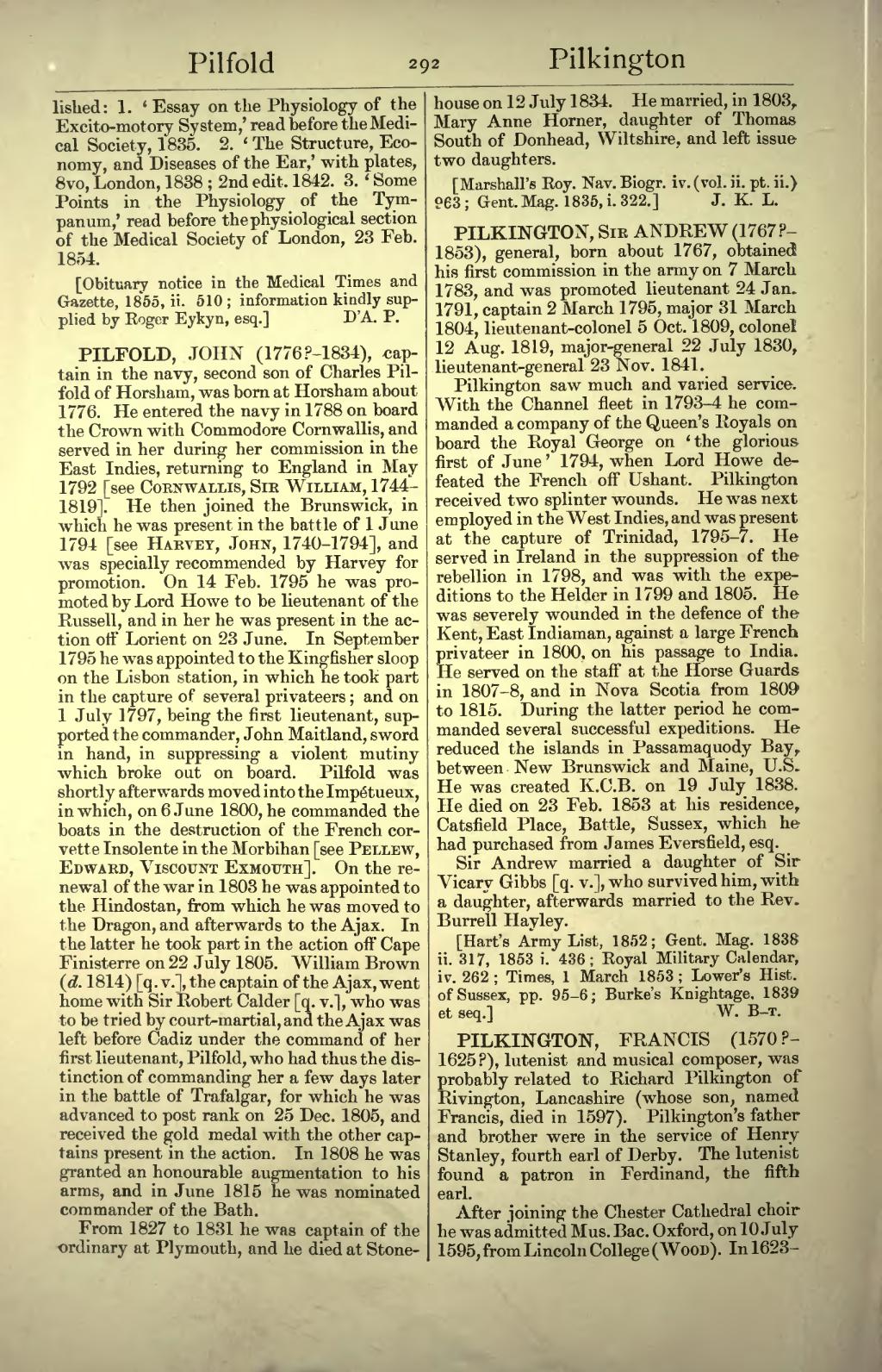lished: 1. ‘Essay on the Physiology of the Excito-motory System,’ read before the Medical Society, 1835. 2. ‘The Structure, Economy, and Diseases of the Ear,’ with plates, 8vo, London, 1838; 2nd edit. 1842. 3. ‘Some Points in the Physiology of the Tympanum,’ read before the physiological section of the Medical Society of London, 23 Feb. 1854.
[Obituary notice in the Medical Times and Gazette, 1855, ii. 510; information kindly supplied by Roger Eykyn, esq.]
PILFOLD, JOHN (1776?–1834), captain in the navy, second son of Charles Pilfold of Horsham, was born at Horsham about 1776. He entered the navy in 1788 on board the Crown with Commodore Cornwallis, and served in her during her commission in the East Indies, returning to England in May 1792 [see Cornwallis, Sir William, 1744–1819]. He then joined the Brunswick, in which he was present in the battle of 1 June 1794 [see Harvey, John, 1740–1794], and was specially recommended by Harvey for promotion. On 14 Feb. 1795 he was promoted by Lord Howe to be lieutenant of the Russell, and in her he was present in the action off Lorient on 23 June. In September 1795 he was appointed to the Kingfisher sloop on the Lisbon station, in which he took part in the capture of several privateers; and on 1 July 1797, being the first lieutenant, supported the commander, John Maitland, sword in hand, in suppressing a violent mutiny which broke out on board. Pilfold was shortly afterwards moved into the Impétueux, in which, on 6 June 1800, he commanded the boats in the destruction of the French corvette Insolente in the Morbihan [see Pellew, Edward, Viscount Exmouth]. On the renewal of the war in 1803 he was appointed to the Hindostan, from which he was moved to the Dragon, and afterwards to the Ajax. In the latter he took part in the action off Cape Finisterre on 22 July 1805. William Brown (d. 1814) [q. v.], the captain of the Ajax, went home with Sir Robert Calder [q. v.], who was to be tried by court-martial, and the Ajax was left before Cadiz under the command of her first lieutenant, Pilfold, who had thus the distinction of commanding her a few days later in the battle of Trafalgar, for which he was advanced to post rank on 25 Dec. 1805, and received the gold medal with the other captains present in the action. In 1808 he was granted an honourable augmentation to his arms, and in June 1815 he was nominated commander of the Bath.
From 1827 to 1831 he was captain of the ordinary at Plymouth, and he died at Stonehouse on 12 July 1834. He married, in 1803, a daughter of Thomas South of Donhead, Wiltshire, and left two daughters.
[Marshall's Roy. Nav. Biogr. iv. (vol. ii. pt. ii.) 963; Gent. Mag. 1835, i. 322.]
PILKINGTON, Sir ANDREW (1767?–1853), general, born about 1767, obtained his first commission in the army on 7 March 1783, and was promoted lieutenant 24 Jan. 1791, captain 2 March 1795, major 31 March 1804, lieutenant-colonel 5 Oct. 1809, colonel 12 Aug. 1819, major-general 22 July 1830, lieutenant-general 23 Nov. 1841.
Pilkington saw much and varied service. With the Channel fleet in 1793–4 he commanded a company of the Queen's Royals on board the Royal George on ‘the glorious first of June’ 1794, when Lord Howe defeated the French off Ushant. Pilkington received two splinter wounds. He was next employed in the West Indies, and was present at the capture of Trinidad, 1795–7. He served in Ireland in the suppression of the rebellion in 1798, and was with the expeditions to the Helder in 1799 and 1805. He was severely wounded in the defence of the Kent, East Indiaman, against a large French privateer in 1800, on his passage to India. He served on the staff at the Horse Guards in 1807–8, and in Nova Scotia from 1809 to 1815. During the latter period he commanded several successful expeditions. He reduced the islands in Passamaquody Bay, between New Brunswick and Maine, U.S. He was created K.C.B. on 19 July 1838. He died on 23 Feb. 1853 at his residence, Catsfield Place, Battle, Sussex, which he had purchased from James Eversfield, esq.
Sir Andrew married at Hayes, on 9 May 1808, Maria Elizabeth, daughter of Sir Vicary Gibbs [q. v.], who survived him, with two daughters, Maria Georgina, married to Burrell Hayley, rector of Catsfield in Sussex, on 18 July 1848, and Louisa Elizabeth, married on 1 Sept. 1853 to Richard Thomas Lee.
[Hart's Army List, 1852; Gent. Mag. 1838 ii. 317, 1853 i. 436; Royal Military Calendar, iv. 262; Times, 1 March, 1853; Lower's Hist. of Sussex, pp. 95–6; Burke's Knightage, 1839 et seq.]
PILKINGTON, FRANCIS (1564?–1638), lutenist and musical composer, was probably related to Richard Pilkington of Rivington, Lancashire (whose son, named Francis, died in 1597). Pilkington's father and brother were in the service of Henry Stanley, fourth earl of Derby. The lutenist found a patron in Ferdinand, fifth earl.
After joining the Chester Cathedral choir in 1578 he was admitted Mus. Bac. Oxford, on 10 July 1595, from Lincoln College (Wood). In 1623–
